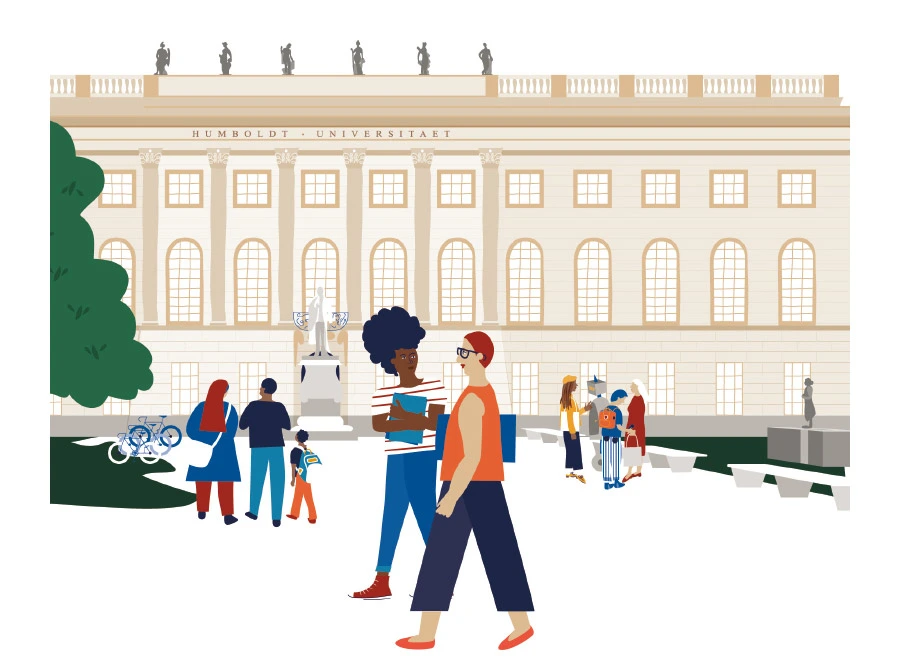Spoken pauses and respect
About the effects of gender-sensitive language
Gender-inclusive language – some find too much fuss is being made about it, others say it is still not enough. How do Adlershof-based scientists and entrepreneurs address the issue?
Late in May, (social) media was alight with comments when Anne Will, a political talk show host, introduced her guest Reiner Holznagel as the president of the ‘Bund der Steuerzahler_innen’, deliberately using a gender-sensitive term for the German Taxpayers Federation and hinting at the underscore denoting non-binary genders with a short spoken pause.
Some feel it’s a waste of time and makes matters exceedingly complicated, others feel genuinely excluded by the use of generic masculine forms – like Leser, Kunde, or Steuerzahler –, which have been used uncritically for centuries, and prefer the feminine form (Leserin, Kundin, or Steuerzahlerin). What’s more, the issue of gender-neutral language is frequently subject to overt polemicism.
Luise F. Pusch, who has been activist for feminist linguistics for 40 years, uncovered many of the absurdities created by the generic masculine form in an amusing and sharp-witted way in her 1984 book ‘Das Deutsche als Männersprache’. And, with that, their effect on equal rights and opportunities. The premise of her book was the powerful effect language has on our everyday lives.
The new best practice guide that Humboldt-Universität zu Berlin (HU) hands out to its staff is based on the same premise. Its aim is to adequately represent the full array of gender diversity in word and image. Ursula Fuhrich-Grubert puts into a nutshell as to why: ‘Whatever we don’t say, we also don’t see or think about,’ she says. In her position as the HU’s central women’s representative, she developed the guide in conjunction with all the university’s so-called status groups and the decentral women’s representatives.
The results are striking. Written in an accessible way, people with a general interest or difficulties in navigating the issue are provided with much food for thought and practical support through ample background information, a wealth of real-world examples, and several linguistic solutions.
‘Instead of telling people what to do, we made a conscious decision to put out guidelines. Our aim was also to facilitate a certain degree of streamlining. Many want to use gender-neutral language in their day-to-day work but don’t know how,’ says Fuhrich-Grubert. These people are confused by the range of approaches that have sprung up in recent decades – whether its naming both genders, or adding a dash, underscore, or asterisk.
The HU guidelines for one recommend the use of the so-called Gendersternchen. By placing an asterisk between the masculine stem and the appended female suffix, it creates a symbolic gap denoting all gender identities beyond ‘male’ and ‘female’.
Seeing as combining these constructions with the gendered German articles (der*die or ein*eine) can be complicated, the guideline contains a wealth of suggestions for alternative, gender-neutral ways of expression, including saying ‘Studierenden’ for students (instead of the gendered ‘Studenten’), or ‘Redepult’ for speaker’s desk (instead of the gendered ‘Rednerpult’), or using the passive voice.
Feedback to the guidelines that have been in circulation since late 2019 were positive throughout; changes have already become visible in many invitations, meeting minutes, and presentations. The few disagreeable comments could be counted on one hand, according to Fuhrich-Grubert. Working at a university though, she was aware of the fact that she worked in a relatively open-minded environment. In the business community or the justice system, where women are generally more disadvantaged, resistance were far greater.
Alexander Seiffert, team leader for digital media at WISTA Management GmbH, also experienced this. As a trained radio journalist, he has been dealing with gender-neutral language for 30 years and has frequently been tasked with communicating for companies. From his experience, progressives and conservatives were often dogmatically opposed to each other. Because of this, what counts for him is respect – in dealing with each other, in his writing, and towards authors and readers. Speaking of authors and readers (Verfasser and Leser), WISTA’s own guidelines recommend the solution put forth by the Duden, Germany’s preeminent language resource: Verfasser/-in and Leser/-in.
‘When writing or editing, I try to consider who originally wrote the article and in which tone of voice, who am I writing for, what is my main aim,’ says Seiffert. ‘It is important not to antagonise anybody. My task is to communicate. Communication should bring us together not pull us apart.’
This requires sensibility and tact. When writing about jobs in a STEM context, for example, explicitly addressing both genders should be commonplace. More technical writing, on the other hand, needed less attention in this regard, says Seiffert: ‘What’s the benefit of sticking to rigid rules if my text ends up being so inaccessible that it goes over the heads of my target group.’
The general lack of a well-engineered solution for these issues is one of the reasons why the WISTA guidelines also lack a distinct gender perspective. ‘It would have to be a solution that even pre-school children could comprehend and use without difficulty,’ says Seiffert. Another idea is to invent a new, unitary form, for example, ‘Physika’ instead of ‘Physiker/-in’. ‘I find this charming because that way it will be new for everybody and it’s easy to say.’
Is this approach too radical? ‘This is debate to be had later on,’ says Ursula Fuhrich-Grubert modestly. After all, it would mean creating an entirely new approach and intervening in the German language to a fundamental degree. To be sure, language is subject to constant change, but opening a pathway to change is hard enough as it is.
By Dr. Uta Deffke for Adlershof Journal
